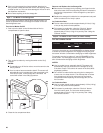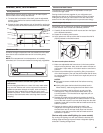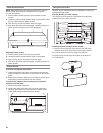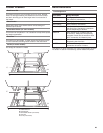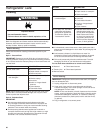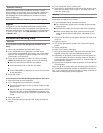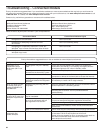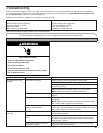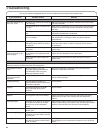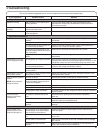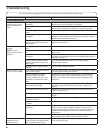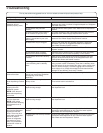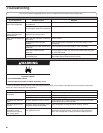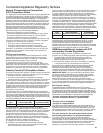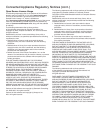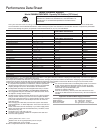
34
If you experience Possible Causes Solution
Refrigerator Operation (cont.)
The motor seems to run
too much. (cont.)
The door(s) are opened too frequently
or for too long.
Warm air entering the refrigerator causes it to run more. Open
the door less often.
The refrigerator door or freezer draw-
er is ajar.
Make sure the refrigerator is level. See “Door Closing and Door
Alignment” section. Keep food and containers from blocking
the door.
The refrigerator control is set too
cold.
Adjust the refrigerator control to a less-cold setting until the
refrigerator temperature is as desired.
The door or drawer gasket is dirty,
worn, or cracked.
Clean or change the gasket. Leaks in the door seal will cause
the refrigerator to run longer in order to maintain desired
temperatures.
The lights do not work. Your refrigerator is equipped with
LED lighting which does not need to
be replaced.
If there is power to the refrigerator and the lights do not
illuminate when a door or drawer is opened, call for service
or assistance.
Doors have been open longer than
10 minutes.
Close the doors and drawer to reset and open to resume
lighted task.
Shelves with under-shelf
LEDs do not light up (on
some models).
Shelf attachment points are not
fully engaged in the adjustable shelf
mounts.
Check that the rear shelf attachment points are completely
seated into the adjustable mount upper face.
Doors have been open longer than
10 minutes.
Close the doors and drawer to reset and open to resume
lighted task.
Unusual Noise
To listen to normal refrigerator sounds, go to the Product Help/FAQ section of the brand website and search for “normal sounds.”
Below are listed some normal sounds with explanations.
The refrigerator seems
noisy.
The compressor in your new
refrigerator regulates temperature
more efciently while using less
energy and operates quietly.
Due to this reduction in operating noise, you may notice
unfamiliar noises that are normal.
Sound of the compressor
running longer than
expected
High-efciency compressor and fans Larger, more-efcient refrigerators run longer at lower, more
energy-efcient speeds.
Pulsating/Whirring Fans/compressor adjusting to
optimize performance during normal
compressor operation
This is normal.
Popping Contraction/expansion of inside
walls, especially during initial
cooldown
This is normal.
Hissing/Dripping Flow of refrigerant in the compressor This is normal.
Vibration The refrigerator may not be steady. Adjust the leveling screws and lower the leveling foot rmly
against the oor. See “Door Closing and Door Alignment”
section.
Rattling/Banging Movement of the water lines against
the refrigerator cabinet or of items
placed on top of the refrigerator
cabinet
Move excess water line away from the refrigerator cabinet or
fasten excess tubing to the cabinet. See “Connecting the Water”
section or remove items from the top of the refrigerator.
Sizzling Water dripping on the heater during
Defrost cycle
This is normal.
Water running/Gurgling May be heard when ice melts during
the Defrost cycle and water runs into
the drain pan.
This is normal.
Buzzing and clicking Heard when the water valve opens
and closes to dispense water and/or
ll the ice maker
If the refrigerator is connected to a water line, this is normal. If
the refrigerator is not connected to a water line, turn off the ice
maker.
First try the solutions suggested here or visit our website at www.whirlpool.com/product-help.
Troubleshooting



